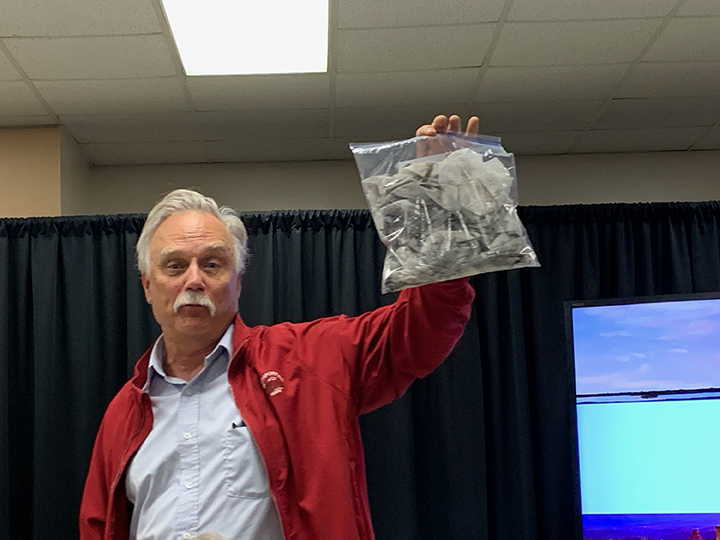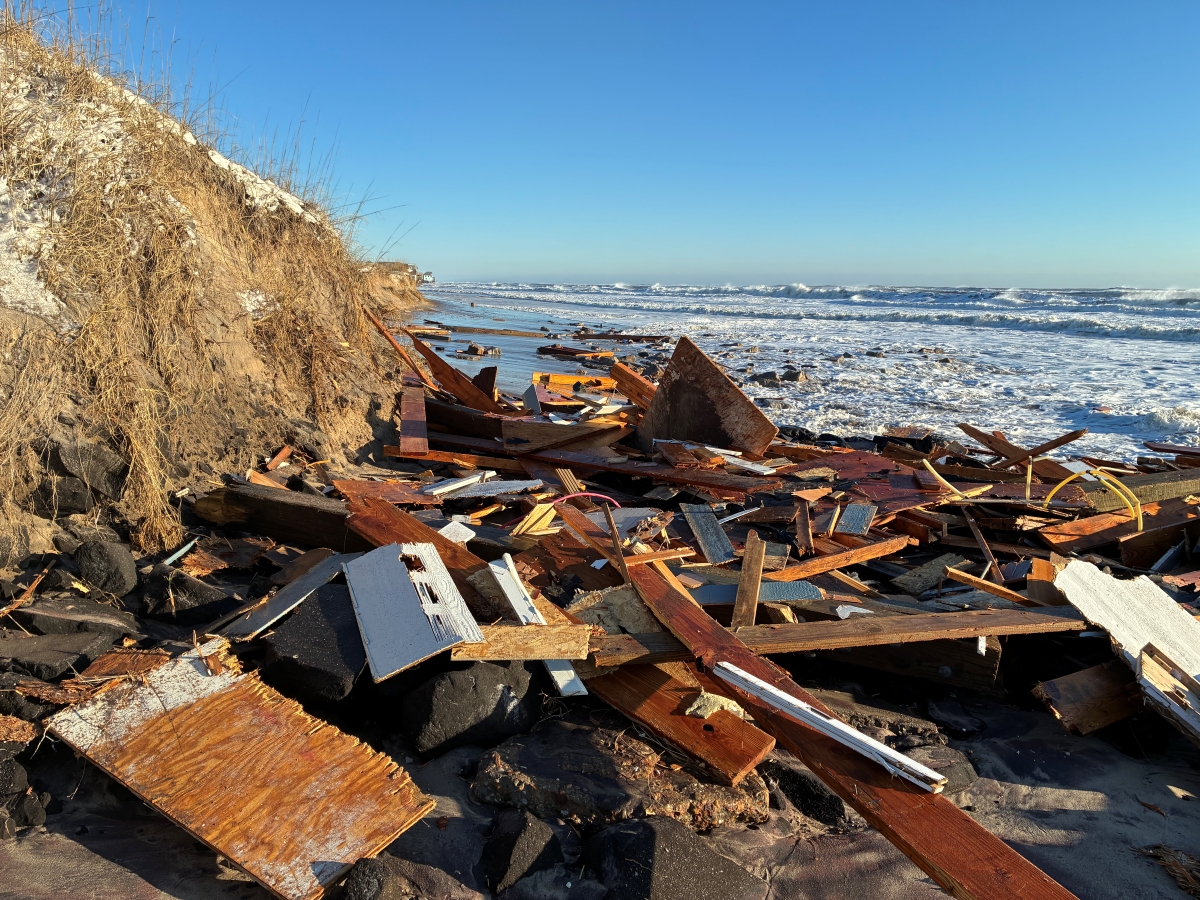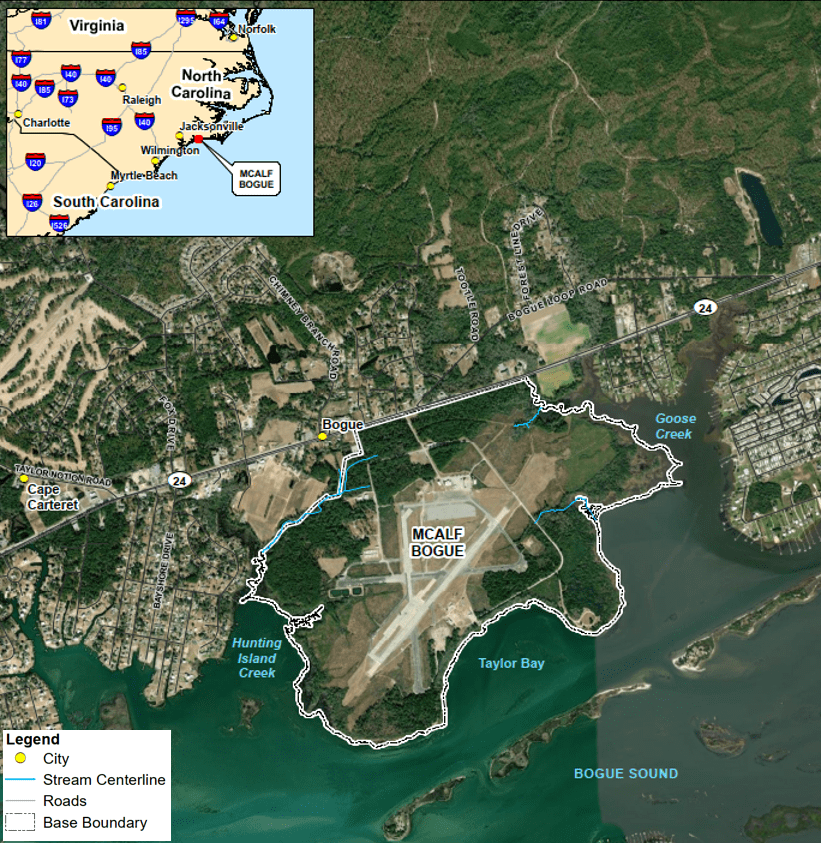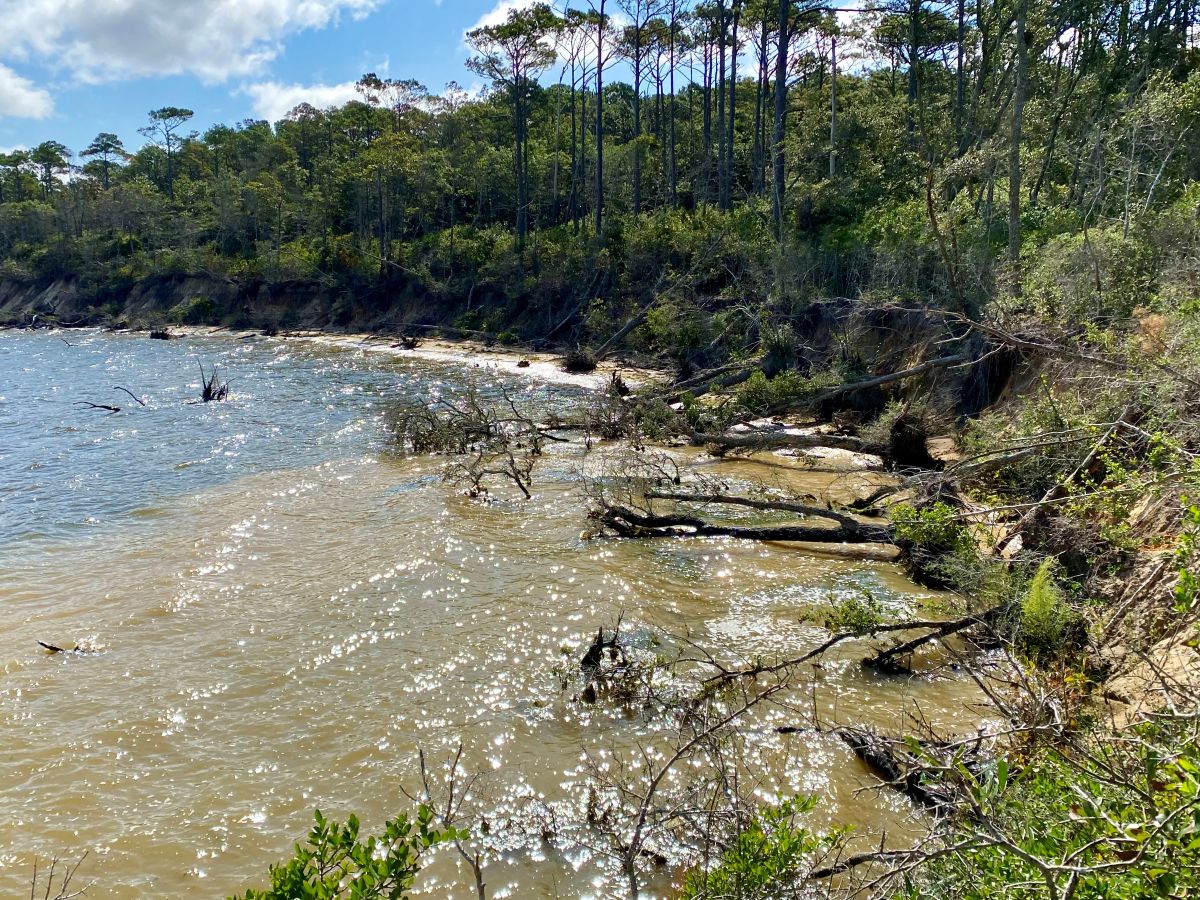
BOLIVIA – Residents from Southport and nearby beach towns urged state environmental quality officials Thursday to strengthen regulatory oversight of a small power plant whose operator is seeking to renew its permits to discharge wastewater and stormwater into a canal that dumps off the coast of Caswell Beach.
One by one, residents at a public hearing hosted by the North Carolina Department of Environmental Quality Thursday night expressed a multitude of concerns about the types of chemicals that accumulate in wastewater and stormwater outfalls at the plant, CPI USA North Carolina, sufficient monitoring of those chemicals and the potential effects of both water and air discharges on wildlife, human health and the environment.
Supporter Spotlight
“I believe this has to be monitored and kept an eye on and we’re relying on you people to keep us safe.”
Edward Dazewiezri, Oak Island
“Here we have a plant that is almost like a Third World country plant,” Oak Island resident Edward Dazewiezri said to DEQ officials. “It’s burning coal, it’s burning tires and it’s burning wood. We’re measuring total suspended solids, but what are those total suspended solids? I believe this has to be monitored and kept an eye on and we’re relying on you people to keep us safe.”
One of the plant’s outfalls captures discharge that must be tested for 126 priority pollutants, which are defined in the Clean Water Act as a subset of toxic pollutants that include heavy metals and specific organic chemicals.
The draft permit would change the current monitoring of those priority pollutants from grab sampling, which is a single sample taken at a specific time, to composite sampling, which collects samples over time and represents the average characteristics of wastewater.
CPI USA North Carolina is a holding company of Capital Power of Edmonton, Alberta, Canada.
The company has applied for two National Pollutant Discharge Elimination System, or NPDES, permits. One permit would regulate wastewater discharge and the other would regulate stormwater discharge.
Supporter Spotlight
The state has rerated the plant’s draft NPDES as a major permit to discharge more than 400,000 gallons of wastewater per day.
That discharge may include bottom ash – up to 17,000 gallons a year. Bottom ash is the course, incombustible byproduct of coal combustion. It has been added to the facility’s wastewater since the plant’s last permit renewal.
CPI has operated the plant located on the fringes of Southport since 2006.
The plant was commissioned in 1987 and first received a wastewater disposal permit from the state June 1 of that year, according to Derek Denard, an environmental specialist and wastewater permit writer for the state Division of Water Resources.
The 88-megawatt capacity plant sells electric power to Duke Energy and steam power to Archer Daniels Midland, a food processing company.
Denard explained that the plant uses a mechanical drag system to remove bottom ash, which is scooped up, loaded onto trucks and taken to an approved landfill.
“There’s no coal ash stored at this facility,” he said.
The plant’s wastewater and stormwater discharge are routed into the same canal used by Brunswick Steam Electric Power Station operated by Duke Energy, which has a 1.9 billion gallons per-day maximum flow capacity into the canal.
Lauren Garcia, an environmental specialist with the state Division of Energy, Mineral and Land Resources, which oversees NPDES stormwater permit applications, said that during the permit renewal process state officials discovered the plant’s stormwater effluent discharge into the Duke Energy effluent channel, not Prices Creek as originally thought by the division.
A combined 2 billion gallons per day effluent from CPI and the nuclear plant travels from the canal into a pipe buried under the Atlantic Intracoastal Waterway before discharging into the Atlantic Ocean about 2,000 feet off Caswell Beach.
The discharge plume was distinctive and easily visible in an aerial photograph displayed on a projector screen in the room where the public hearing was held on Brunswick Community College’s campus.
Pete Key, president of the Brunswick Environmental Action Team, or B.E.A.T., said no amount of bottom ash discharge is acceptable.
Instead, CPI should be required to catch effluent that contains bottom ash and haul it by truck from the site.
He asked state officials to reject the permit applications.
Southport Mayor-elect Joe Hatem said he, like many residents, was unaware CPI was discharging effluent into the canal.
“We still don’t know the full ramifications of what we’re being exposed to,” he said. “The stuff that you’re wiping off your cars, you can’t wipe it out of your lungs, so we have to be vigilant.”
Residue from the sky
Southport resident Carole Kozloski said she is all too familiar with the accumulation of black, greasy grit emitted from the plant that coats everything from her outdoor furniture to the sidewalks in her neighborhood of Harbor Oaks.
“Sometimes on our furniture there’s actually chunks of ash,” she said in an interview days before the public hearing.
Kozloski and her husband live roughly a half mile from the plant.
She and other residents who live near the plant said they must routinely wipe down porch railings, decks, porch steps and driveways.
Two years ago, CPI footed the bill to clean homes in the area after an incident occurred at the plant that released a cloud of black, ashy residue that landed on the properties of Southport residents near the facility.
She told state officials at the public hearing Thursday that the discharges from the plant into the water and air can’t be good for the environment or human health. “I would ask that you strengthen their permit request to better protect our residents and their water.”
During the hearing, Southport resident William North carried with him to the podium a clear, plastic bag filled with black-smudged paper towels used to wipe off the residue falling from the atmosphere onto his and his neighbors’ properties.
“This is what we wipe off our porches every day,” he said as he held up the bag. “It falls from the plant. The chemicals being released by the plant are worrisome.”
“The chemicals being released by the plant are worrisome.”
William North, Southport
While coal-fired production has been decreased by 90% at the plant, about 50% of its fuel is generated from burning wood and tires. The wood, which is chipped on site, has been treated with the preservative creosote, a gummy, tar-like mix of hundreds of chemicals.
Residents who live in neighborhoods roughly a mile from the plant say they’re not sure if the residue comes from burning tires or creosote-coated wood.
“I’ve never lived anywhere where there was so much black residue where it just keeps coming back,” Southport resident Ann Carey said. “There’s a lot of concern about any health issues that it could cause. I want to know, is it something that’s unhealthy and are they operating within whatever guidelines they’re supposed to? I want to know that I’m not endangering myself.”
Donna McGramaghan has owned her home in Southport for 14 years. She became a permanent resident of the city six years ago.
“In the early years they burned coal, and every time I would come for a weekend I had to clean my front porch and my white rockers,” she said. “There was always a film of coal dust on it. Coming from Pennsylvania that seemed very strange. I can tell you that my steps are slippery. If I don’t wash my porch off and wash my steps I could slide down on them.”
In 2016, the state Environmental Management Commission granted CPI a special order by consent, or SOC, after determining plant emissions of sulfur dioxide exceeded the National Ambient Air Quality Standard.
The SOC expires Dec. 30, 2020.
The Southern Environmental Law Center has requested that the state hold a public hearing on the draft permit.
The state will accept written comments from the public on the plant’s draft NPDES permits from wastewater and stormwater discharge through Dec. 23.
A final decision on the permit will be made no later than Feb. 19, 2020.
Comments may be submitted to Derek Denard, N.C. Division of Water Resources Water Quality Permitting Section, 1617 Mail Service Center, Raleigh, N.C. 27699-1617. Comments may also be emailed to PublicComments@ncdenr.gov. Include “CPI” in the subject line of the email.







